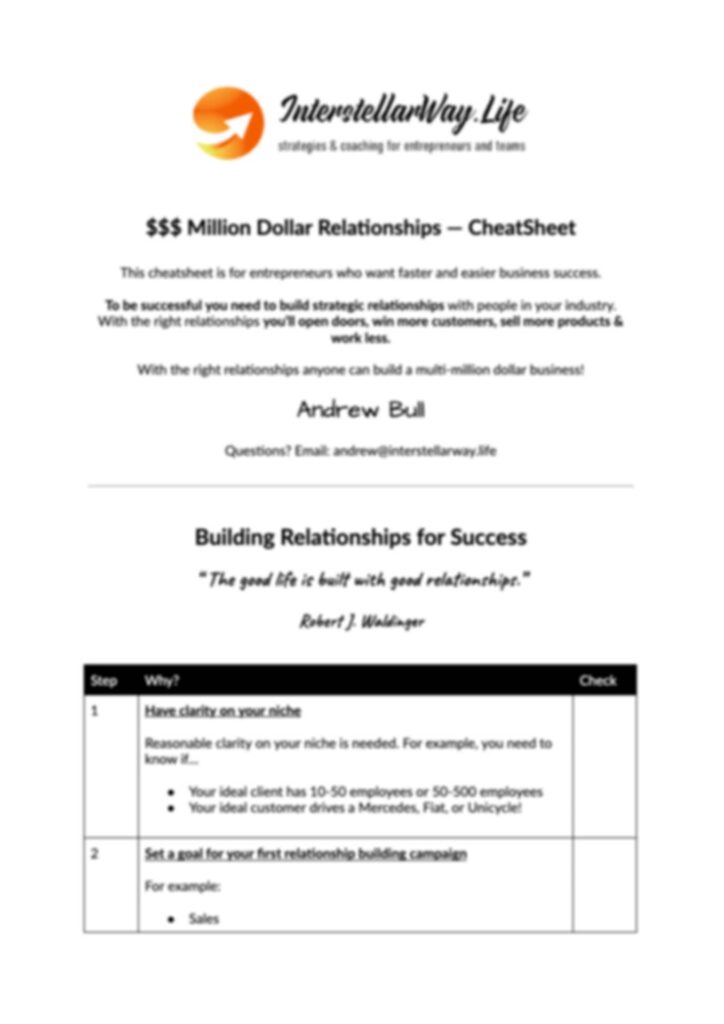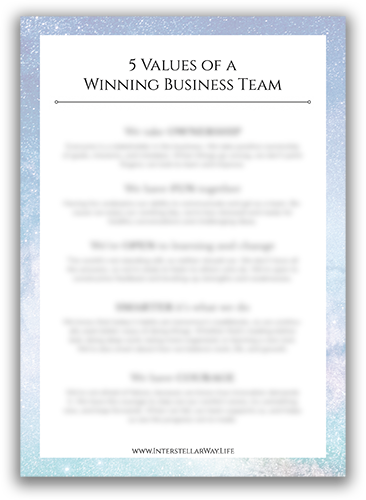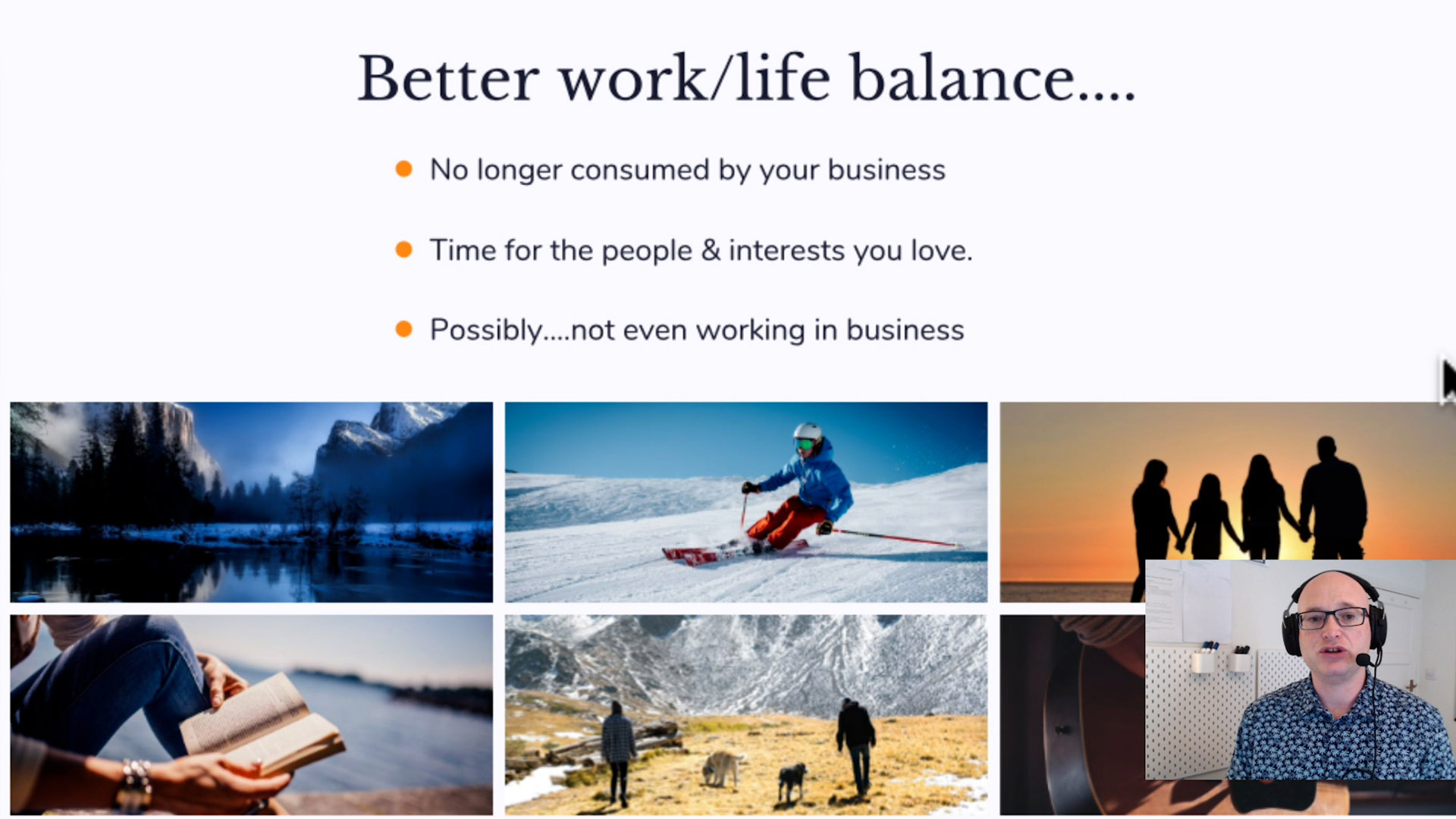Interstellar Business Show
Podcast for Technology CEOs and their teams.
It's time to grow your mind, elevate performance, and own your future 🚀

Interstellar Business Show
Episode: 0003
Business Finance: Marco Poliafico on finding funds and investments
Featuring....

Episode Introduction
Andrew is joined by Marco Poliafico, a Start-Up Coach. Marco works for GE in their Renewable Energy Department, and he’s also a busy startup mentor and business coach. His expertise is in financial modeling and investment. We had a lot of fun chatting with Marco and Andrew learned a huge amount about finance, and I’m sure you will too. If you’re exploring funding options for your technology business, you must listen to this episode.
Episode notes & resources
Marco’s linkedin page –> https://www.linkedin.com/in/marcopoliafico/
Transcript
Please note, this transcription is autogenerated, so there may be errors.
Andrew Bull 0:15
Welcome to another insightful and educational episode of the interstellar business show. I had a lot of fun recording this interview with Marco. He’s a really intelligent guy. He works by day for GE in their Renewable Energy Department. I think that’s the right word. And then also he’s a startup mentor and business coach. So he was very knowledgeable at a high level obviously with G but also with a more getting down to it with smaller businesses with a start up mentoring and business coaching as well. And his expertise is in financial modeling and investment and a lot of things to be honest with you are beyond me, but I had a lot of fun and I learned a huge amount recording this interview with Marco today, who’s going to get the most out of it?
Andrew Bull 1:00
Well, I think if you’re considering a tool that you might want to start up a software as a service business, or you’ve already started one up, and you’re considering how you might further get investment into your business would be the right investment options for you, then I think you can gain a lot from listening to this show, because we talked about a lot of the investment options that are available advantages and disadvantages in various areas. And Marcos just got a excellent knowledge. So it’s really worth listening to this show. And it was it, like I said was educational for me as well. So I’m sure you’ll learn something, too. Alright, without further ado, let’s crack on with the show. Hi, Marco. Thanks for joining us today.
Marco Poliafico 1:40
Hi, Andrew. Good morning. Good morning to everybody listening to your show. And thanks for having me here with you talking about this important topic for startups. Thank you very much.
Andrew Bull 1:50
Oh, we’re pleased to have you. So why do we need to raise funds? I mean, it’s kind of obvious, you don’t have enough money. But you know, can you explain that a little bit more of a new way?
Marco Poliafico 2:01
Yeah, sure. I think that it’s a perfect way to start the why why do it in money? And typically the answer is from any startup when I talk with them is, Oh, of course we want to scale up, we want to grow up very quickly. And for us to do that we need more money. That is the main reason in my experience mentoring startups. However, there can be other situations which of course, we don’t hope for, for example, when there are problems with a cash flow. And that is a case when startups and companies in general need money. Or simply have a say when product development cycles. So basically how long it takes from when you start developing your product until when you can sell and get income. It’s very long. So you need basically to finance it. So it’s not really scalar. But it’s a matter of the product side. These are the main three reasons that setup look for money for
Andrew Bull 2:57
Okay, yeah, so I guess that makes sense. Because that the reality of how long it takes you to get to market and to get profitable enough to cover your costs, it might take a bit longer than you would expect. And actually, I guess it might be worth talking to a few people who’ve already done this and talk to them about actually how long it’s really taken them. His I think we’re all probably a bit too ambitious and unrealistic about how long things sometimes take. And I think actually knowing that instead of you getting to any kind of profit, maybe after year one, it might be year two or year free. before that happens. And therefore that might change your whole approach to how much money you think you need to get a 401k
Marco Poliafico 3:38
Absolutely. And if nothing else, he can help you planning. He can help you be more realistic. He can help you build up contingency. So absolutely. That’s a very good advice.
Andrew Bull 3:49
Okay, great. Great. I try I try my best I try and mix it up with some terrible advice as well. But yeah, a good bit of advice. Thanks for as well. So in terms of options that are available, then what what kind of options can we look at using for Finance?
Marco Poliafico 4:06
Okay, so let’s try to give a general really other view of how can we get money when we have our tap our small companies at the very beginning, I’d say there are four main routes, not all of them are suitable. And that is where it’s important to have a strategy and we might come to it later on. So I would say the first one is yourself, friends and family monitor, you can collect from really not official sources, but people around you or your savings yourself basically. The second one is that the third one would be equity. So selling shares of your company. And I would say a fourth one, you know, everything else. So all the creative ways and and will not fall in this three categories that I mentioned. So. So that is just to give an overview. And of course, if you want we can go more into the tank so far. Yeah, I’ve
Andrew Bull 5:05
I think what you know, I think it’d be good to just talk quickly about the the advantages and disadvantages of each of those approaches. So I suppose if I’m funding this from my personal money, or from my personal circle, you know what, what I guess the advantages are that I stay completely kind of completely in control. Although there might still be a couple of stakeholders there, if I go running off to mom and dad to get alone, or my brother or sister and so on. And I suppose even then life is joining with you and your partner, there could be a bit of pressure there as well for that for the money to actually bear fruit. What would you see as the positives and negatives there?
Marco Poliafico 5:45
Yeah. So absolutely, I think I would remark and highlight and stress again, all the things that you said, very wise, pure wisdom. So please listen to Andrew Today, it’s very true. The benefit of using savings and friends and families that of course, you have easy access to them or easier, at least the one compared to other sources. But of course, you might die some personal relationship, and that might not be the best outcome. So you need to manage those stakeholders as well. But that said, I definitely think compared to debt and equity, there are some benefits. So let’s look for example, other debt situation, you can raise that when you have loans, for example, or you want to use your credit card or you want to do overdraft. Or in some cases, it’s possible to do what they call factoring. So loans we know about them, and they can be secured or unsecured. And that is where we have to start looking at the details. So the secured one is for example that you have there are a nice equipment with you to do this recording. And you say Okay, look, I want this money. And as a security, which means that if I’m not able to be back this and today I have with you, I will give you this beautiful piece of equipment, which is worth some money, basically, of course, what happens is that startups, they typically would not have any security, yes, they could use the car, the house, and that might not be the wisest choice. But when the long become unsecured, what happens is that the interest is higher. So that is where we start looking at the different options and pros and cons of course, hi their interest that means more difficult to buy credit cards and overdraft. Well, they seem to be quite easy we see as well, in our personal life, when bands tell us Oh, you have this overdraft, you can use but mind you, because if we lose track, and we end up being in the need of paying the interest that can really kill you. Because I mean, it’s really really high interest. So it is difficult to manage those elements. So one of the easiest with that is typically he might be suitable for companies that have ready a cash flow that can actually show track record that have actually healthy balance sheets, possibly audited will happen is that if investors potential investors in this case are not investors of equity, but banks, for example, they give you the the money, they say, Okay, yeah, we can afford to give you this money, because as we can see from the papers, you actually are able to buy if the startup is not in this situation, so very early stage, when they are still developing their idea, well, that might become very hard to get access to. That is where we might want to shift back to the first option of friends and family. So that is about that. And the pros and cons. So if you add them, yes, you can pay back Body, Mind the very high interest rates, and you need to demonstrate that you’re able to pay them.
Andrew Bull 8:58
Yeah. And I just want I’d say two things. First off, if you’re listening to the show, and you’re thinking about getting loans, and so on, please do seek out your own independent financial advice. Because we thought we can’t we can’t tell you during this show exactly what you should do. You should go and talk to set an ex, your own interview expert. But there’s a couple of things. And let’s say it when you mentioned factoring before, there’s one option of financing. That’s invoice factoring, where you sell your invoice. Absolutely. And people keep Parfitt invoice, right? And that’s the way they make their money.
Marco Poliafico 9:28
Yes. Basically, if you’re afraid you have some debt or so as a company, you already sold some stuff. Have you ever worked in accounting rules, they’re called the receivables. So you didn’t cash in the money. So what happens is that you have those invoices piece of paper to say I have a credit with any customers. And basically you go to the bank and say, Look, I have this piece of paper that demonstrate that I have credits. So what happens is that the bank, typically based on those credits that you have, they will be able to grant you some money from the way typically is not the most convenient way. Because of course, they if you have credit for a total of 1000 pounds, they may give you maybe 90 80% of it straight away. So pros and cons, you have the money straight away, but you don’t get back, of course, then the sum of the credits will go back to the back and not to you that’s that’s the way
Andrew Bull 10:20
Yeah, I guess, I guess if you’re in immediate need of cash flow, then that could be a good thing to look at one thing I would also say is also consider, I mean, because personally, I’ve you know, many years ago, I got into a situation where with my credit card with just having equipment on a credit card, and the interest payments got really high. And really, I just had to start looking really seriously at what I really needed. And what was really essential for running my business and what wasn’t providing real value. And just get rid of a load of stuff to cut my monthly outgoings to make. So I would say, it’s not just a case of going, I want all this stuff and I want to do all this stuff, and I’m going to borrow money to do it, I think you need to take a serious look about what you really need, as well to make your business work.
Marco Poliafico 11:09
Absolutely before spending, the best way to get finance is saving. So not spending Actually, that’s the best way to get finance because if you can’t, and there are different ways we can see you violent in London, for example, there are a lot of CO working spaces, that is a good idea to save money on the asset on the renting, for example, because you might pay a low cost space for you to work. And there are other benefits, as we know, networking and all the other elements. But yes, absolutely. What you said is very, very much true. The best way to get financed is not spending at all. So you have money available for something else.
Andrew Bull 11:47
Yeah. Okay. Brilliant, really? And what about so we’ve talked about personal funds, we’ve talked about debt financing. So let’s talk about equity. And I think that people would be quite interested in because I always say slight that Alan sugar type thing, when you go into a room with a load of like serious people, and they go, Oh, I love your idea. And they’re just going to give you loads of money, but can you can you just give us a bit of a grounding at the reality to that place?
Marco Poliafico 12:13
Well, I will not disappoint some of the people, your audience of people listening to this show. The reality is actually that let’s start from who they are and how you can get back with him. What does it mean? So when you get back with him, instead you give out and that is a very important part, give out part of your shares. And who comes on board. Typically, we know angel investors, they are high net, people high net worth investors, they invest their own money, or venture capitalists, the typically venture capitalists manage people of other investors. So first of all, you need to give them the shares. And that is a variety of first element the first element of learning because as a matter of fact, you were announced to the control your baby. And that might not be very helpful when you actually are pivoting pivoting is a terminology that is used to describe the father when you develop your business plan. And when you develop your initial track records, the idea that you go to the market with is most likely to be different from the original idea that you had. Which means that if you actually end up engaging yourself with a venture capital within an angel investor, one of the two things could happen. First, they might say oh no, for if you want more money, you need to do a and b, so they actually divert from the original idea, you’re part of the development. And they bring you to their own idea, which is a bit of a pity, maybe because you were so proud of your bed you were so proud of your boy you are creating. And the second thing that could happen is actually that you engage through a contracted to debt idea at the point in time in which you are actually getting their money, which means that you cannot easily be building anymore, which in turn means that you actually cannot adjust the business idea to the market. So first of all, you lose your control. Second, if any of your all the people listening will have already had some experience with venture capitalist, they know that a fundamental part of the process is the valuation stage, in simple terms, is when I look at your business plan, and I say okay, how much is it worth? And you might say, Oh, it’s worth 1 million pounds. And they say, I don’t think so, what happens is that the discount rate that investors, whether they are angel investors, or they are venture capitalists that that discount rate is very high, which means that for the same amount of money, they want to have more of the shares, whereas you will live for example, to give out to anybody, and they say none of this amount of money 130 percent, and then it becomes very, very tricky, then there is a some other thing to keep into account. So first of all, investors investors are attracted by companies that show huge potential. Typically this potential means innovation. Typically, that means a total addressable market, which is very large. Think about Airbnb, think about Facebook, I think about many companies that we know out there they are mass they do they have in front of them really a global scale. And that is where the investor says oh, there is a huge opportunity for me to earn money. a start up, which typically has a niche market at the beginning, which typically has a proven track record. It’s such a difficult timing in convincing those people there is a famous say from angel investor, I think they say we like to invest the in lines, not dots, because they want to see the progression. And there is another element that is important to mention. And I will say another one is the time consuming is so investors and finding them and approaching them and working with them. It’s a very time consuming part of your job as an entrepreneur. And admittedly, somebody might say this is time that you could dedicate actually to increase your sales, to improve your business model to do all the things that make yourself top grow. So yeah,
Andrew Bull 16:35
I think that idea of time, actually, as being a negative is really, really interesting. And the fact you’re right, you know, you’re going to have to manage those people. They’re essentially you’re you’re you’ve now got a double sided business in some ways that you have your, you know, actual customers, but you’ve got a client in some respects, who are your investors, and so you have to manage them and their needs and expectations, and then trying to maybe change the directions. Will you try to stop them changing the direction too much? Yeah, I can see it’s a big time, you know, potential time suck. Yeah, totally.
Marco Poliafico 17:10
Unless know, if you allow me some more couple minutes more just what two minutes to say the exit strategy. Now that is interesting. When we look for a job, and we go for an interview, we say, what about in two years time, and you have to show that you’re committed that you want the job, but that you want to go ahead and put them of your life. Now, we investors, this is exactly the opposite, they want to see an exit strategy. Because the typical investors want to gain money, they are not really interested in getting along with you for the rest of their lives. So you have to show a clear exit strategy. And this is something that typically, business plan lack. So remember, in our business plans, when we develop our business strategy to always include an exit strategy that is be convincing and clear for the potential investors that makes the investment more attractive, not less attractive.
Andrew Bull 18:08
Okay. Interesting. How that Yeah, how you get out is just as important as how you get in. And one of the things that struck me, I suppose, is that you’re saying investors are mainly looking at these big global ideas, like the next Facebook I suppose, or Airbnb. But a lot of people listening to the show are going to be from a tech background. And so they’re probably be thinking about, they might be thinking about public facing tools. But they’re also be thinking about b2b tools. And you know, the next LinkedIn or, you know, an actual marketing technology tool that’s going to help people. So, you know, do we need to go see a different group of investors or their specialist investors for b2b? So you know, SS investment?
Marco Poliafico 18:51
Yeah. So t legal investors follow different sectors. And what I mean to say, is there a golden rule for from the investor side point of view is that, and what Mrs. Holloway, Warren Buffett certainly always says that never invest in something that you don’t understand. This is the famous sentence from Warren Buffett. So from their point of view, they want to invest in something they understand. And that’s why you will find out there different investors. And again, I don’t I’m not making any difference at the moment to the when the venture capitalists and angel investors, but I talked about investors in general. And they might be specialized in a specific niche industry or a specific sector be to be b2c. Right. They let cleantech pharma. So it’s important that you actually approach plenty of them. Don’t be discouraged by the fact that many of them might not be convinced, but it’s not because of your idea. It might actually be because they don’t master that sector or they are not interested interested in that sector, he might be very useful to have a before approaching them, making your market research and understand and trying to become the ones that are more likely to be interested in that sector where you operate, technology public be to be whatever that might be. And why not the last advice that we give is like an investor runs the due diligence on your business plan. You as an entrepreneur, you should run your due diligence on the investor, there is a an advice given by some investor and by some other people in Silicon Valley, they say, Well, you know, what? called their boss, and called the boss to ask how do they behave when something goes wrong? Because at the end of the day, at the beginning, we’re all flattering, you know, we are allies, and we say, Oh, yeah, come on board. And of course, there will be an organization that first person wise, the character wise, we are trying to be as nice as possible, then when things get a bit wrong, and you know, they go on the hard part. And then things don’t come up as easily as you would expect it on your business plan. We say that before? How well you can work with a with an investor. So do and run your due diligence about them. Likewise, they run their due diligence about you. That’s important.
Andrew Bull 21:22
Yeah, I think so yeah, relationships are key. And you’re right, how those relationships going to work under stress. And you don’t want people just gonna flip out and not be constructive. During those key moments. You know, you want people who’ve got a good track record of helping startup succeed as well. And you. So no wonder around a bit with the options available. We’ve we’ve talked about personal funds, we talked about equity, and we’ve talked about debt financing. And then there was one more to take off, which was the creative or other sources. So I think we should just briefly touch on those now. Yeah, what would be these other options that yeah,
Marco Poliafico 21:57
I mean, in that category ever put down everything that is not included in the previous three. And they could be possible grants, or they could be some form of partnerships, or they could be for example, competitions. So for example, if you have access to a company that I started, that I’m actually starting working with right now is they’re based in Australia. And I said, Oh, as far as I know, you are paying for this mentorship, because I’m in contact with them through a an incubator, to say, you know, actually, we want it because there was a competition with a San Francisco based incubator. So in the creative ways, I put all those ideas or tools or avenues that are different from the previous three. And yes, always, don’t forget, actually to look at this type of avenues for that my bring you some money, try to let work, try to go around the bands and see whether you can network with other people in the SEO, you know, there is an event page for a competition, Virgin startup, for example, they do that for some setup, and they offer money at the end. So please is what I mean by creative ways. And definitely, I would say not to neglect that.
Andrew Bull 23:04
And also being in the martech industry, like I am one of the I suppose one of the interesting players out there in our niche and industry is app Sumo. And there’s a few other companies like that, who are, essentially they sell lifetime deals on early SAS software. And that’s quite an interesting way of getting early finance as well, because you’re not giving away shares in your business. And so all you’re doing is offering a lifetime version of your product at quite an early stage of development. So people often investing, they’re investing in what the product is now. But they’re also investing in hopefully, how they see it’s going to be as well. So that that’s kind of an interesting way of doing it as well.
Marco Poliafico 23:48
Yeah, sure. Absolutely.
Andrew Bull 23:50
Yeah. So how should we approach the process of financing? How do we determine what we need, and so on.
Marco Poliafico 23:58
And I would say that based on the what we’ve been discussing, so far, I think the most important thing we mentioned at the beginning is plan in advance, try to understand, as an entrepreneur, try to understand what is your need, how much money you need, don’t forget to do what wise Andrew are right advice to you, which is a catch your responses as much as possible, which means that you will need finance down the road, trying to understand when you need it, because Don’t forget, if you get some money now, for simple debt, you need to pay interest on it. So, try to study and plan the timing of when you need that money. So, overall, try to build the strategy and based on the different elements that we discussed today. So that equity or friends and family, typically they are more suitable to certain type of setup that depending on when they are within the journey. So depending on where you are, just check, which is the best the most appropriate way for you, you and approach in a way that you have a bland and well suited strategy. That is the best thing that I feel to say on top, of course of all the consideration that we share so far.
Andrew Bull 25:10
Okay, or video. That’s great advice, Marco. So what’s the most appropriate source of funding if you don’t have a very good track record, if you’re just starting out,
Marco Poliafico 25:20
most likely friends and family savings. So if you don’t have a track record, if you cannot show anybody balance sheets, or the fact that you have clients of Randy, and that is actually very important. I met with many, many different startups. And typically, this happens in the tech environment, because you know, we all think about the next topic that could break the world and it could become the next unicorn. But typically my question to challenge them, when they say about unicorn, and whatever is well, okay, do you think it’s violence that creates unicorns, or are potential universe that attracts the good finance, because unfortunately, I think that is the key element. We approach finance as a way to sort out all our problems. But the investors will never be attracted to our startup, unless we can prove a truck reckless have to go back to what you just said, if we don’t have track record, if we don’t have clients, we actually have to start going down there, creating a niche market, getting a little bit of visibility to our brands. Starting having a track record is hard as that could be. But there is no the investor that could resolve this problem, the investor is not there to give us the initial track record. So if you really need money, and cutting the expenses is not enough. I’m afraid the personal savings, or friends and family or and other option, maybe more than the creative side is as with equity. So from sample get involved somebody who is an expert about some specific topic where you recognize them a gap, and they will invest their time, they will give you their advice. In exchange, you have a contract with them, you’ve actually make an agreement to offer shares of your company to be better when we start being sales and whatever, that will have a bit of the gain. Of course, you have to agree all these elements. There could be another way. In Okay, when
Andrew Bull 27:27
you have an interest in. Yeah, so that’s another option for if you haven’t got a proven track record, okay, two options. They’re great. And so, you know, what are the actual size of people looking for? They’re looking for a lot of money coming into the business, either looking at you
Marco Poliafico 27:43
something in terms of size of investments or sign off?
Andrew Bull 27:47
Yeah. In tighten tone, from the investor’s point of view, they look, when they look at you as an investable proposition, are they looking a lot of cash flow coming into the business or whatever happens? They can be looking at what match you know, what makes metrics are important to those investors?
Marco Poliafico 28:01
That’s very interesting question, actually, thanks. Because we didn’t mention these elements before. Thanks for for reminding me. So first of all, yes, of course, the cash flow in terms of looking at the track track or the looking at the innovation, looking at the type of solution that you create is important. However, and that is where I see many startups getting bogged down and really lost because they focus 100% of their effort into the product. But mind you, many times, investors look more at the team behind. So when I say the team, it means that competences, investors, somebody says investors invest on, actually, there’s a famous sentence, they say, invest on the Joker and not on the horse. So yeah, you don’t invest on on the product, you invest on the people behind it, if there is a problem on the market is not the solution of the will address. The problem will make you a unicorn is the people behind that that will be able to be voting and they will be able to amend they would be able to create a better say speech or a better value proposition or change the business model. So my advice is really, of course, the product is important track record is very important. And we mentioned all the stats, but the team, the team, I remember talking with us the top and they created the nap. And I said okay, who is your team? And said, Oh is just myself as I was going to do the marketing? Who’s going to do the who is the person specialized in finance, or? Nobody? I’m looking for them? Well, you know, I was saying before touching base with investors, you might want to create a team that gives a credibility to your idea. So that’s a very important element.
Andrew Bull 29:56
Yeah, that is you’re right, that hundred percent, that is a that is a very important idea. Yeah. And I suppose moving forward, then you need to like keep an eye on all of these things, and almost have like a scorecard. And maybe quarterly Look at all these different points in your scorecard and go and see where your how well you’re doing, and have plans in that next quarter to maybe move one of those things forward to get your city you know, if an investor is crucial to your business plan, then get yourself fighting fit. You know, it’s a bit like a football. All right, you’ve got to get it you got to get into training, if you’re no good. If you’re not good at passing the ball practice passing the ball, you know, so
Marco Poliafico 30:33
absolutely. And that goes back to their relationship. And how important that is. There are companies startups, if they really wants if they really are convinced that the venture capitalist investor in general are their solution ahead, you know, they go there and say, How can I make my business plan more suitable, more attractive to you. That is the way it works. make it attractive, really fight for it, as you say the end, don’t forget, it is about trust and relationship, trust and relationship,
Andrew Bull 31:09
hundred percent, the relationship is really, really key. And if you’re not that familiar with starting up, you should definitely look at into lean thinking as well. And there’s plenty of books like that you can find online and lean is a way of starting and growing a business in a way you build it lean and ready to pivot and move. And I think if you’re familiar with those philosophies, then I might put you in a better place for getting investment as well. Which brings me back to a point that Marco made which is about the investors are probably going to like people who’ve already had a few successful projects. But not only that, probably people who’ve had some challenges in their projects, and then they’ve had to do like a big pivot, like they’ve changed customer segment, or they’ve changed a product slightly, or they’ve checked, you know, they’ve changed a crucial part of it to overcome a big hiccup. And I think that would make you a lot more investable, if that’s happened to you. When we talk about bootstrapping versus external funding, if you were starting from scratch Marco, what would you choose?
Marco Poliafico 32:09
That is a very controversial debate. Because I know that the mainstream and the narrative, the media out there, say that the Holy Grail is the investor. So go out there and look for an investor he will sort out all your problems, he will make your life easy and whatever, to be honest with you. And I’m not the only one thinking dad. I was listening to some podcast a couple of months ago, there is actually an interesting course online. From john Moulins. I think it’s the surname is a professor, a London Business School. And they talk about the benefits of bootstrapping, versus looking for investors. So bootstrapping, when we talk about bootstrapping a means to start your business with your own means we are on financial mentor. So in this case, just to link with the terminologies that we use before it means a friends and family means your savings, bootstrapping gives you the freedom to first of all, concentrate on the real important things that you need to do to give track record to your startup. And we say before that looking for investors, means a lot of time consuming activities dedicated to building this relationship. bootstrapping leaves you the full freedom to be able to pivot wherever and whenever you want to amend your business idea, and make it more suitable for the market. So that is great. There is another interesting aspect, which I didn’t mention before, but actually is mentioned by this professor. And he’s the psychological factor. He says, and apparently there are some research about that the basically, as soon as you get the money, you get sloppier, let’s say you got Oh, I have the money. Now everything is sorted out, you know, I can live with no promise. Now I dealt with it. The money is the solution to everything. And instead, the professor and other people say actually, if you don’t have the money, yes, it is more challenging, but there is the right reason why you actually are still there, focus 100% committed to actually bring to life your vision, and you don’t rely on some external factor. So there is this psychological fruit, which I didn’t mention before. That is someone mentioned, and we might want to think about that as well.
Andrew Bull 34:33
That’s really interesting. I’ve read a book called how we decide by Jonah Lehrer. I think I’m saying that right. Le HRVRN. He talks about children and learning and how they strive to do better. And actually, if you tell kids that they’ve done well, then they kind of plateau and stop. And I suppose that’s the same with entrepreneurs, you know, you’ve got your money, you’ve done wealth, they stop. Whereas with these kids, when they told them that was a great effort, so not saying it was a that they’ve completed, that you said it was a great effort, the kids kept on trying, and they weren’t scared also about failing, because that’s part of it as well. Because I think if you get investment, you feel like, oh, what I’ve done now is correct. So I’m scared of changing too much because this is how I got my investment. So I get scared of moving things forward. And fear. Fear is a it’s something that holds us back hugely. Fear is a massive motivating audit this motivating factor for us. So I you know, I think there’s a lot in what you’ve just said.
Marco Poliafico 35:32
Yeah. And I think it’s Victor ago, either. I’m not sure. But he says adversities creates man. prosperity creates monsters. Oh, of course, we are going to beat the devil. Yeah, I was listening in the motivational speaking at the very interested in this part of motivational stuff and psychology for for entrepreneurs as well. And I’ve read somewhere. So of course, it’s a bit maybe not really related to start tops. But yes, it’s very much in line with what you just said. Yeah.
Andrew Bull 36:02
Interesting, interesting. And you know, there’s going to be show notes for today’s show on the bright arts website on so go to breitbart.co.uk and head to the podcast page, and you’ll find this episode with Marco Polo leaf, poly Africa, do my best do my best Marco. And you’ll find show notes there. And you know, I’m going to put in the links for the books that we mentioned today. I’ll get those books that Marco mentioned today. I’m also going to put in a link to Marco’s LinkedIn profile. So if you’ve got questions, or you want to get in contact Marco, because I know he’s a top top guy, we met a number of years ago when I was talking and bore everyone saw when I was running, but yeah, I’ll put those links in the show notes. So do head to pilots.co.uk. Go to the go to the podcast page and check out this episode for the links and the book references because those but those books are amazing and really interesting as well. And yet well Marco is brilliant having you on the show today. I think we learn. I mean, I genuinely learn so much from today’s episode about investment. I think I’m still quite scared about going to talk to investors. I think it’s bit for me, it’s a bit like going to talk to the head teacher maybe I don’t know, you know? Yeah. Anyway, anyway, that’s my issue. That’s my issue. So anyway, have you any final thoughts that you want to leave with, because a lot of people listening to this show are going to be tech business owners or people very interested in tech, who maybe have service companies who are like thinking about turning, you know, Software as a Service, taking a service and building an app or something for that? Did you have any, any ideas? The final thoughts you want to leave with them?
Marco Poliafico 37:40
I think I will go back to one of the things that I mentioned before, typically I notice and fair enough, I know where we all come from. When we develop a business, we focus on the product. And this could happen with tech companies as well, of course, but I typically say it with so many things startups. And I typically go and repeat the same slogan. And I say, look, the product is not the business, the product is that to to make the business, the business is a profitable organization is a business model that in a profitable way, make you gain some money and make you provide some value. Let’s leave aside the money aspect, but provide some value to your customers through the services and solutions that you developed. So they are not themselves the business. And I typically say this because oh yes, true. Because typically in sister Tampa, we and it’s fair. As I said, I I know where we come from, we focus on the product on the service. And then we forget all the other things that come around, we need to commercialized, we need to bring the brand to life, we need to understand all the finance work, we need to understand how the market out there works. And we need to understand our investors work and what they want it for want to engage with them. So that might be my final thought hold it then of course, saying a big, big thank you for having me on the show. And, and for this very, very pleasant chat.
Andrew Bull 39:11
Okay, brilliant. Thanks very much for joining us today. Marco. I’ll talk with you soon. All right. Bye now.
Marco Poliafico 39:17
Sure. Thanks. Bye, bye. Bye. Bye, everybody.
Andrew Bull 39:33
Well, I had a lot of fun and learn a lot talking with Marco in the interview. And I hope you did too. I would say if you’re thinking about making some serious financial decisions about investment and so on, then do go and get your own advice. I mean, I hope we’ve given you some great ideas. And give me some knowledge that’s going to help you with what you choose to do with finance or when as and when you need it. But yet do go and get some personal advice for you and your situation, because that’s going to be unique to you. I would also add that I think you should carefully consider wherever you take investment and finance from friends and family, because you could be causing problems in other areas of your life. And you know, this shows I’ve said is about growing, working, and living smarter. And I think you’re potentially putting two areas of your life into conflict, you know, trying to grow fast and grow the right way, and then potentially living at the right way and being on good terms and at peace with your friends and family who mean a lot to you. So really do consider if you’re careful if you’re going to go down that route. I’d also very seriously look at what outlays you really need when you’re first growing your business. And that doesn’t really matter if you’re going to be a small software as a service business, or big software as a service business. I mean, you need to have another look and see what do you really need where those luxury items that you can get rid of goes actually if you’re going to go and talk to investors as well, they’re going to want to know that you can make serious decisions. And then you’re not going to load up your business with a load of vanity things that you don’t really need. So do you have a serious look at that. And I think that’s about it for this week’s show. Go and check out the show notes on the Brian arts website, which is a bright arts co.uk and the kind of podcast and then you’ll find the episode of Marco and I’ll put all the resources in the show that we mentioned today, the books and also the link to Marco’s LinkedIn profile as well. And if you’re interested in being a guest, also drop me a line on the website if you’ve got something valuable and insightful to share with other tech business owners or other people work in the tech industry. And if you haven’t subscribed, why haven’t you subscribed already. There’s gonna be a lot more great interviews with people who’ve got a lot to share. They’re going to help you move your business and help you grow work and live smarter. All right.
Andrew Bull 42:01
Thanks for listening. Thanks for being here. Catch you soon.
Andrew Bull 42:16
This podcast was brought to you by bright arts agency







